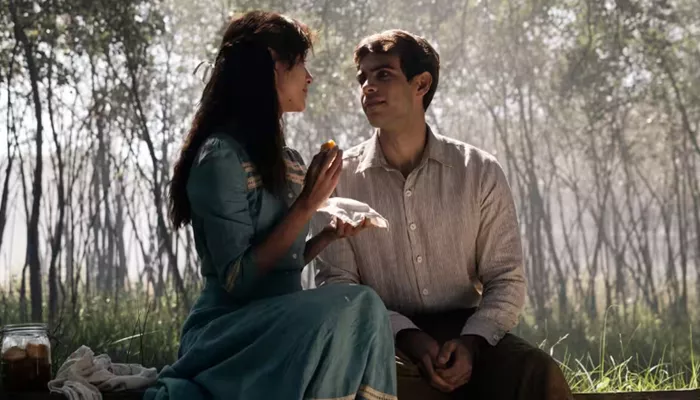The highly anticipated television adaptation of the 1989 Mexican novel Like Water for Chocolate has arrived, offering a sumptuous blend of visual and emotional storytelling. Marking the first adaptation of Laura Esquivel’s beloved work in over 30 years, the six-part series promises to captivate audiences, much like its iconic predecessor, Alfonso Arau’s 1992 film. Both the new series and the original movie are now available on SBS On Demand.
Set against the tumultuous backdrop of the Mexican Revolution in the early 20th century, the series delves into the life of Tita De La Garza, played by Azul Guaita. Born into a family bound by tradition, Tita’s story is one of personal rebellion and unyielding love.
A Tragic Beginning and a Cruel Tradition
From the moment of her birth in her family’s kitchen, Tita’s life is steeped in tragedy. As the youngest of three sisters, she is shackled by an oppressive family custom: she must remain unmarried to care for her widowed mother. Her life, dictated by this tradition, seems devoid of hope—until she falls deeply in love with her neighbor Pedro (Andrés Baida).
Tita’s unfulfilled longing for Pedro manifests in an unusual and magical way. Her emotions—whether yearning, despair, or passion—infuse the meals she prepares, evoking visceral reactions in those who consume them. This supernatural connection between her feelings and her cooking becomes a poignant symbol of her inner turmoil.
Love and Revolution Intertwined
While the Mexican Revolution rages outside, another battle brews within the De La Garza household. Tita’s defiance of her mother mirrors the nation’s struggle for liberation, drawing parallels between the personal and political. As Tita seeks freedom to love Pedro, her journey becomes a metaphor for breaking societal and familial chains.
Directed by Julian de Tavira (Red Queen, Hernan), the series brings to life the vibrancy and depth of its source material. From its meticulously crafted costumes to its intimate cinematography, the show captures the essence of early 20th-century Mexico.
A Sensual and Visually Stunning Experience
Salma Hayek’s production embraces a lush aesthetic, with warm lighting, slow-panning shots, and rich visual textures. The detailed depiction of food preparation is particularly striking. Each episode highlights a dish, weaving culinary artistry into the narrative. Close-ups of cinnamon melting into sugar or eggs being folded into cream evoke as much passion as the tender moments shared by the characters.
Food serves as an extension of Tita’s emotions, acting as a medium through which she connects to those around her—and especially to Pedro. This culinary sensuality is as central to the story as the romance itself.
A More Nuanced Adaptation
Unlike the 1992 film, this serialized format allows for a deeper exploration of the novel’s complexities. Themes such as racial caste systems and familial dynamics, particularly the role of Tita’s older sister Rosaura (Ana Valeria Becerril), are given greater attention. The series also incorporates elements of magical realism, a hallmark of Mexican literature and cinema, to blur the boundaries between the fantastical and the real.
A Story of Defiance and Empowerment
Like Water for Chocolate is more than a tale of forbidden romance. Its title, derived from a Spanish expression about emotions reaching a boiling point, reflects the intensity of Tita’s struggles. At its core, the story celebrates the resilience of women and their ability to challenge patriarchy, whether in the kitchen or on the battlefield.
Through Tita’s journey, the series explores themes of love, loss, and empowerment, all while indulging the senses with its rich storytelling and visuals. The magical realism woven into the narrative transforms everyday moments into extraordinary ones, showing that even in the face of insurmountable obstacles, love and hope can prevail.
For those seeking a deeply emotional and visually breathtaking drama, Like Water for Chocolate is a must-watch—a timeless tale that continues to resonate across generations.
Related topic:
Marvel’s “Vision” Series to Bring Back Iron Man Villain Raza in 2026
“Fourth Wing” TV Series Cast Rumors Heat Up
‘The Pitt’ : A Gritty and Graphic Look at Modern Emergency Medicine

